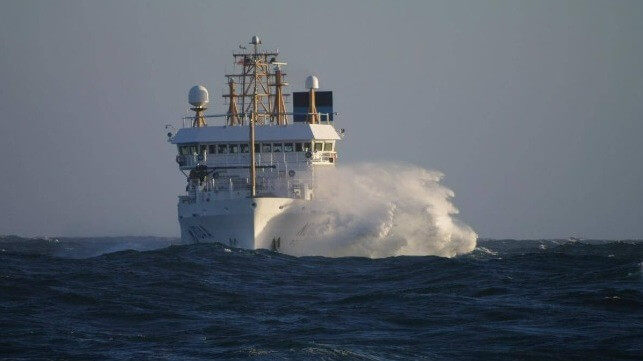Vestdavit to Supply Davit Systems on NOAA Ocean Research Newbuilds

[By: Vestdavit]
Vestdavit is maintaining its role as a trusted supplier of advanced boat-handling technology to support ocean research with the delivery of davit systems for a pair of newbuild scientific vessels being built for the US’ National Oceanic and Atmospheric Administration (NOAA).
The company has now secured a contract with US shipbuilder Thoma-Sea Marine Constructors to supply one of its HN-5000 workboat davits for each of the two vessels, named Oceanographer and Discoverer, that are under construction for the NOAA at the Louisiana-based fabrication yard.
It is the latest in a series of contract awards in the ocean research business area for Vestdavit, which has previously supplied as many as 20 davit systems to the NOAA in recent years following its first delivery in 1995.
“The latest order represents a continuation of our strong relationship with the NOAA, which is one of the most important customers for Vestdavit. All of the dual-point davits in the NOAA fleet are currently Vestdavit systems,” says Magnus Oding, General Manager of US subsidiary Vestdavit Inc.
Reliable launch and recovery
The HN-5000 davits, due for delivery in mid-2023, are designed for reliable launch and recovery in variable sea states of workboats that will be used to carry out diverse missions ranging from general oceanographic research and exploration to marine life, climate and ocean ecosystem studies.
The two vessels, each with a 20-strong crew and accommodation for up to 28 scientists onboard, will also be required to perform maintenance on buoys and moorings, deploy scientific instruments to collect weather and water column data, and conduct seafloor mapping surveys.
Survey and data collection work will entail operations in different marine environments across the globe spanning shallow coastal and continental shelf waters to deep ocean conditions.
“NOAA is an organization that launches boats on a daily basis when carrying out missions. This is a very good fit for us, since we focus on organizations that use their davits frequently and will need robust systems that can safely be used even in rough weather,” Oding explains.
Advanced features
The high-specification features of the HN-5000 make it well-suited to the operating requirements of challenging ocean conditions, enabling workboats to be safely launched and recovered in very rough weather.
The davit system incorporates motion compensation and safety features such as independent dual winches with independent constant tension, shock absorbers, guide arms and a Programmable Logic Controller (PLC) for digital remote control.
Independent dual winches can operate separately or synchronized, and each winch can independently provide constant tension, which is “a really advantageous feature when recovering boats in really rough weather”, according to Oding.
Shock absorbers, with one for each wire fall, remove 80% of peak loads to ensure a smoother ride for the crew of the workboat while guide arms serve as anti-pendulation devices that follow and stabilise the boat during davit in/out operation.
The PLC allows for pre-programmed motion sequences, which enables the davit operator to focus on the small boat and crew.
Operational flexibility
The self-contained davit is skid-mounted that makes it easy to install on the deck of the vessel at the yard while also allowing operational flexibility as the skid is adaptable with locks for mounting of an ISO container instead of the davit if required for specific scientific missions.

that matters most
Get the latest maritime news delivered to your inbox daily.
The Oceanographer, which will have Honolulu as its home port, and Discoverer, to be homeported at Rhode Island, represent a significant expansion of the NOAA fleet to facilitate its work to explore and gain vital understanding of the oceans that cover 70% of the Earth’s surface and are essential to supporting life on the planet.
Thoma-Sea’s Project Manager Mike Rowsey says: “These two vessels will be equipped with advanced technology for scientific research but also require reliable operating equipment to ensure the safety and efficiency of boat missions. Vestdavit’s proven track record in this area has given us the confidence that its davit systems are fit to handle ocean challenges.”
The products and services herein described in this press release are not endorsed by The Maritime Executive.
